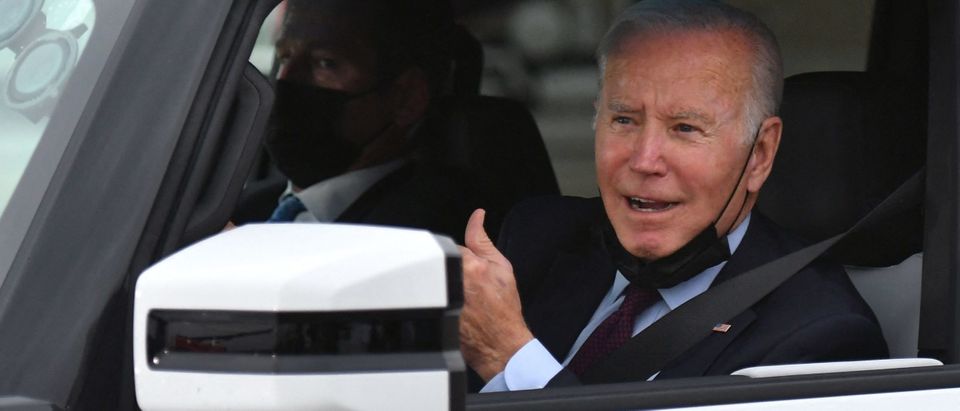The Biden administration is getting significant pushback from auto industry representatives over its anticipated tightening of EPA rules governing tailpipe emissions. In a draft memo leaked this week, the Alliance for Automotive Innovation (AAI) refers to the proposed standards as being “neither reasonable nor achievable in the timeframe provided.”
Honestly, that describes pretty much the entire energy/environment agenda of this presidency. Specific to this latest EPA crackdown, AAI — which represents most EV makers in the U.S. other than Tesla — notes that the “proposed rules effectively assume that everything ‘will go perfectly’ in the transformation to EVs between now and 2032. The agency unrealistically assumes, for example, an over-abundance of battery critical mineral mines, critical mineral processing capacity and battery component, cell and pack production facilities lead to continued battery price reductions. The recently released Q1 2023 Get Connected EV report shows how China dominates those areas.” (RELATED: THOMAS PYLE: Biden Bends The Knee To Radical Climate Activists Yet Again)
For electric vehicles (EVs), this issue of critical mineral supplies is the key to everything. The main reason why EVs weigh so much more than gas and diesel powered cars is the prodigious amount of critical energy minerals that go into the making of the lithium-ion batteries that power them. The minerals required include lithium, nickel, cobalt, manganese, and graphite, all of which are recovered via hard rock mining operations.
But the U.S. and other countries in North America and Europe made a collective decision to essentially farm out the business of hard rock mining to developing nations and the processing of them to China in the 1980s as part of the environmental priorities of that time. As a result, most supply chains for these and other key energy minerals are under control of the communist Chinese government.
Obviously, that is not a situation that promotes a high degree of energy security, either for the automakers or the United States. In June 2021, President Biden seemed to recognize this issue and promised his regime would mount a “whole of government” approach to developing necessary mining capacity and supply chains in alliance with friendly countries outside of China. But progress from this initiative has been predictably plodding and modest, leaving U.S. automakers increasingly stuck with a raft of new mandates and timelines they increasingly fear they will be unable to fulfill. (RELATED: DAVID BLACKMON: The Head Of BlackRock Is ‘Ashamed’ Of ESG? Give Me A Break)
In its memo, AAI refers to the proposed EPA regulation as a “de facto EV mandate,” a description the Biden government frankly admits is correct. EPA itself says the regulation is designed to effectively mandate that EVs make up fully 2/3rds of all cars made in the U.S. by 2032, just 9 years from now. This compares to EVS making up less than 6% of U.S.-manufactured autos in 2022.
AAI points to several other unrealistic assumptions EPA makes in its proposal. One such assumption holds that government will continue to expand consumer subsidies to the point where their benefits will exceed the cost of the battery, i.e., that making and installing the batteries will essentially cost automakers nothing. “These assumptions are not realistic,” AAI responds.
AAI points out further that, while developing this “de facto mandate” for EV manufacturing in the U.S., the EPA “proposes NO requirements to ensure that charging and refueling infrastructure will be available at homes, businesses, public event venues, highway corridors, transportation hubs or other public locations.”
While it is outside the scope of AAI’s comments, it should also be noted that the suite of subsidies in last year’s Inflation Reduction Act (IRA) also do not include anything targeting the dramatic expansion of high-voltage electric transmission lines that will be required to accommodate the similarly dramatic increase in power generation capacity needed to recharge all these millions of EVs EPA envisions by 2032. Nor did the IRA include any provision designed to expand U.S. manufacturing of electric transformers that are key components of power transmission. The U.S. is currently experiencing a severe shortage of these transformers, most of which must be imported, with no relief in sight.
This combination of ill-considered mandates, poor planning, broken promises and fantasy-based timelines seems destined to create a severe energy crisis in the U.S., mostly likely sooner than anyone expects.
David Blackmon is an energy writer and consultant based in Texas. He spent 40 years in the oil and gas business, where he specialized in public policy and communications.
The views and opinions expressed in this commentary are those of the author and do not reflect the official position of the Daily Caller News Foundation.
All content created by the Daily Caller News Foundation, an independent and nonpartisan newswire service, is available without charge to any legitimate news publisher that can provide a large audience. All republished articles must include our logo, our reporter’s byline and their DCNF affiliation. For any questions about our guidelines or partnering with us, please contact licensing@dailycallernewsfoundation.org.


